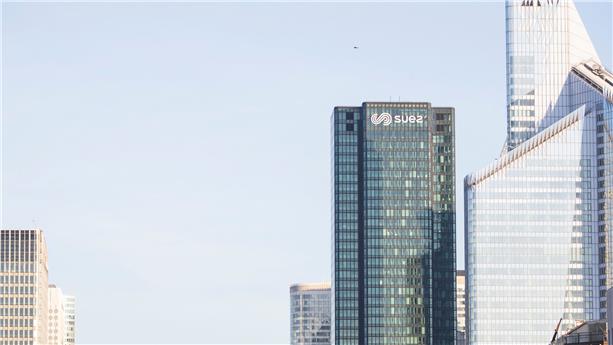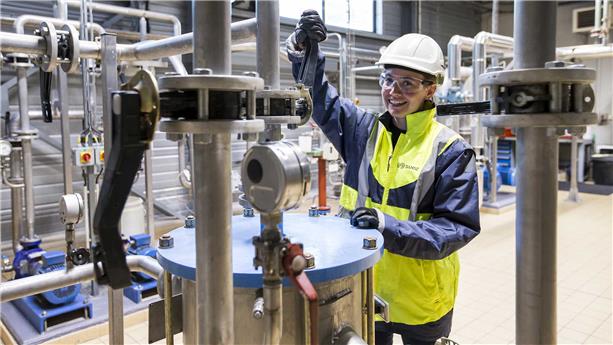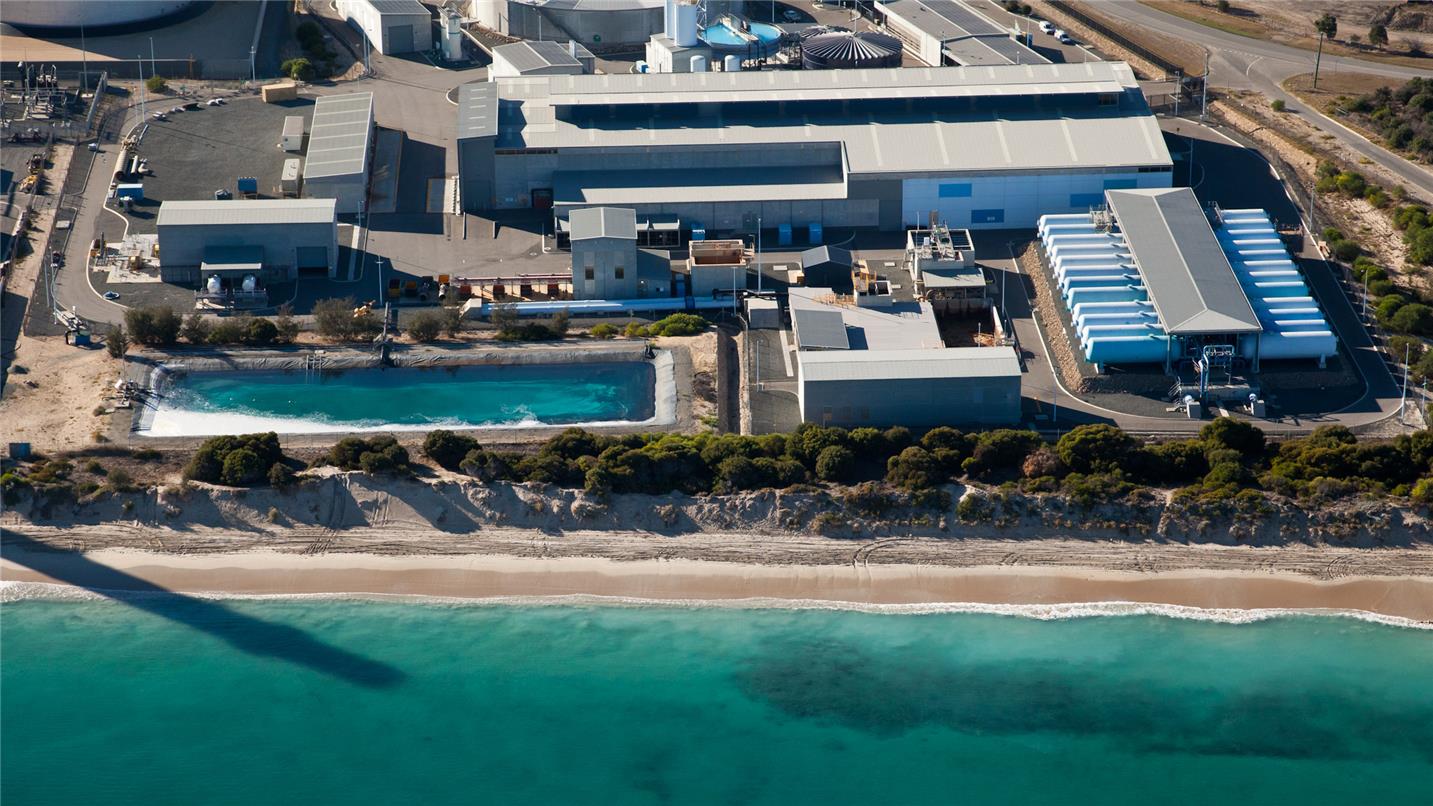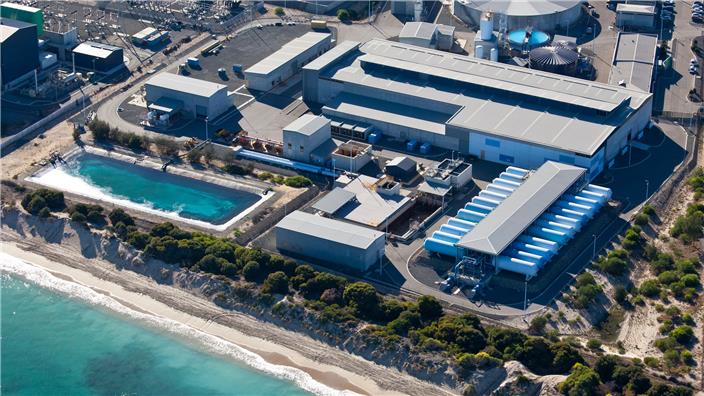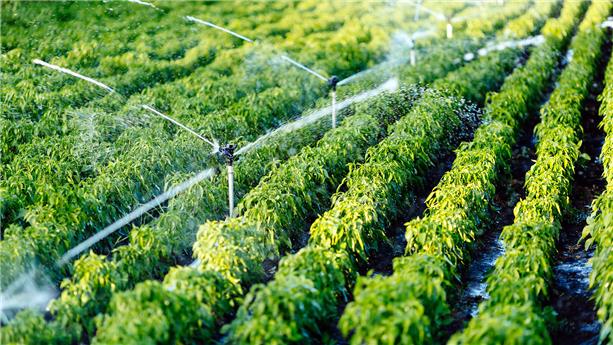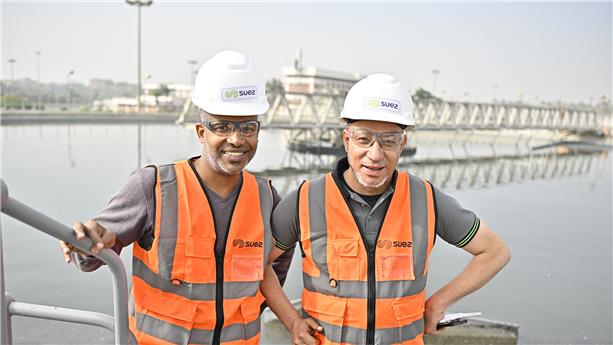
- An alternative resource to secure the water supply
- Sustainable desalination management
- Robust solutions to produce quality water
Form is loading.
If the form does not load after a few seconds, please reload the page (CTRL + F5 or (or Cmd + Shift + R on Mac).
Securing drinking water resources
We provide you with our expertise in the design, construction and operation of seawater or brackish water desalination plants. Our solutions are perfectly suited to meet the requirements of your country, whether for the production of drinking water, irrigation or for your industrial water needs.
We offer tailor-made desalination plants or containerised modules depending on the production capacity sought. We incorporate the latest technological innovations to be at the forefront of performance and minimise operating costs.
In addition, we are committed to a sustainable approach, using renewable energy and implementing energy recovery systems to reduce overall consumption. We support you throughout the development of your desalination project, from the design phase to operation and maintenance.
With SUEZ, you benefit from recognised expertise and a long-term commitment to the success of your desalination facilities.
Tailor-made, virtuous and sustainable desalination units
A design-build tailored to your challenges
At SUEZ, we rely on our expertise as a builder-operator acquired throughout the world to offer you accessible solutions, designed and built according to your specific needs and each type of water to be treated.
Modular desalination units adapted to your use
- From seawater or brackish water for the production of drinking water, irrigation or industrial water,
- For plants of all sizes
A range of technologies to secure your plant's production
- To maximise the availability of drinking water production regardless of the quality of the water resource
- Mature, robust solutions that have been proven for more than 20 years on large plants (> 100,000 m3/day)
Adapted operation and service solutions
- We put our experience as an operator at your disposal
- The constant search for operational excellence is in our DNA: optimisation of operating costs, minimisation of water losses, etc.
- Intelligent management based on predictive models
- À la carte services: supply of spare parts, rehabilitation, staff training, etc.
Innovating in favour of a desalinated water tariff close to that of conventional drinking water
At SUEZ, we provide you with original solutions and innovative high-performance technologies:
- Financial and contractual solutions to reduce investment costs,
- Cutting-edge technologies to optimise processes and reduce operating costs,
- Operational support tools to secure fresh water production and optimise operating costs on an ongoing basis
- Partnerships in particular for joint management of water and sanitation services, with the aim of optimising costs and controlling the ecological footprint.
A controlled environmental footprint
At SUEZ, in line with our sustainability roadmap, we are committed to developing circular solutions for desalination.
- Our designs incorporate energy recovery systems that reduce your plant's overall consumption.
- The use of carbon-free or renewable energies, such as wind and photovoltaics, can improve the carbon footprint of your desalination units.
- In addition, we manage brines in a controlled manner, thus preserving marine ecosystems.
- These same brines can also be recycled.
These solutions meet the energy and environmental challenges of your country, thus promoting your anchoring in a circular economy dynamic.
Continuous innovation to anticipate your future drinking water needs
Pre-treatment: a crucial step
In reverse osmosis desalination plants, water goes through several stages in order to purify it and make it drinkable. A crucial step, the pre-treatment of seawater improves the performance of reverse osmosis. Our pre-treatment solutions make it possible to:
- Guarantee plant availability in any seawater condition
- Decrease overall pre-treatment water losses, even in plants where seawater degradation is occasional
- Improve the quality of pretreated water to increase the service life of reverse osmosis membranes.
With good sea quality at the entrance to your plant, high-speed filtration upstream of the reverse osmosis membranes will prevent them from becoming clogged. Our SeaClean® range of pressure filters achieves acceptable inlet water quality for chemical-free membranes.
With a so-called difficult seawater quality, it is necessary to add a flotation step upstream of the filtration. Our SeaDAF® range of rapid dissolved air flotation (DAF) solutions not only make reverse osmosis water production safe against algal blooms, but also has benefits for downstream processes outside of these events.
Combined solutions for a small footprint and optimised performance: our combined flotation solutions (DAF) and media pressure filtration reduce the pre-treatment footprint by more than 30%.
Brine recovery: bringing new materials to life
The recovery of brine now makes it possible to develop more sustainable desalination projects through the reduction of discharges into the natural environment, a solution with high added value in terms of economic and societal impacts.
SUEZ is developing a brine recovery sector that allows you to:
- Extract and recover CO2 and use it to meet the alkalinity requirements of the produced water;
- Produce better freshwater quality by reusing a mineral blend based on calcium and magnesium;
- Produce reusable acid for seawater pre-treatment and membrane cleaning.
These processes are suitable for desalination plants of all sizes.
They trust us
Victoria State Desalination Plant (Melbourne, Australia): the largest desalination plant in Australia, sustainable and environmentally friendly
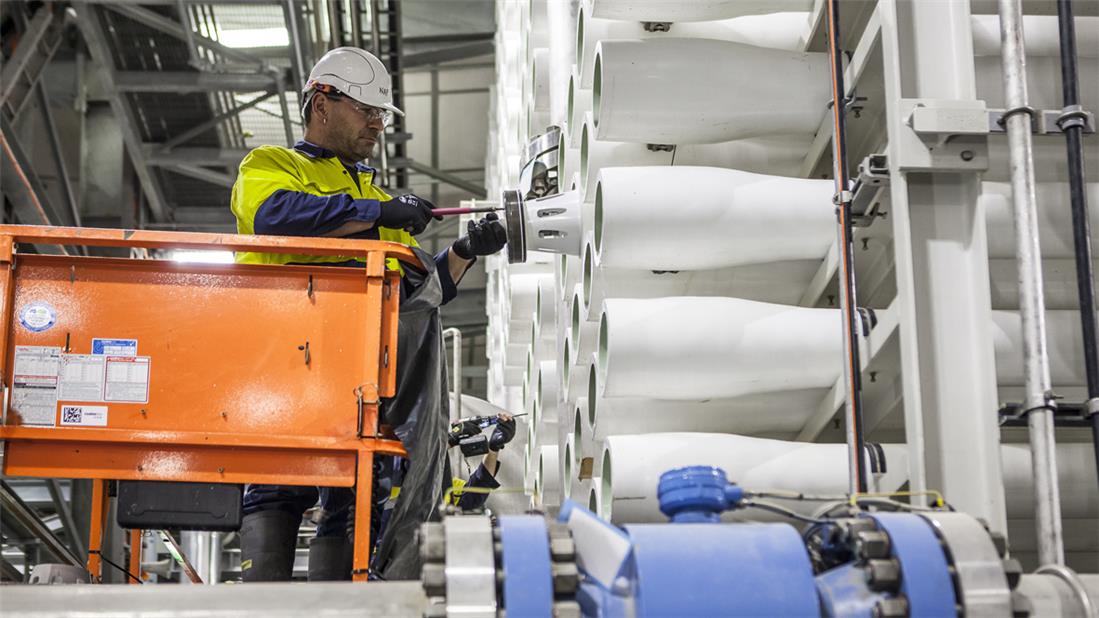
Wuanhua Peiglai Desalination Plant (China): a complementary water source for the chemical industrial complex that will save more than 36 million m³ of fresh water per year
Frequently Asked Questions
Desalination is based on reverse osmosis technology, a high-precision process that removes salt and other dissolved solids from seawater or brackish water. This technology uses semi-permeable membranes to separate unwanted minerals from the water, producing high-quality fresh water suitable for a multitude of uses, from human consumption to irrigation to industrial water.
A desalination plant discharges as much water as it produces, but what is characterised today as a discharge will be considered tomorrow as an alternative resource for producing minerals.
Energy consumption remains higher than that of treatment processes on conventional freshwater resources, however optimisations are still possible and the use of carbon-free energies limits the environmental impact.
A 100,000 m³/d desalination plant (650,000 population equivalent) requires the equivalent of the energy production of 3 8 MW wind turbines.
